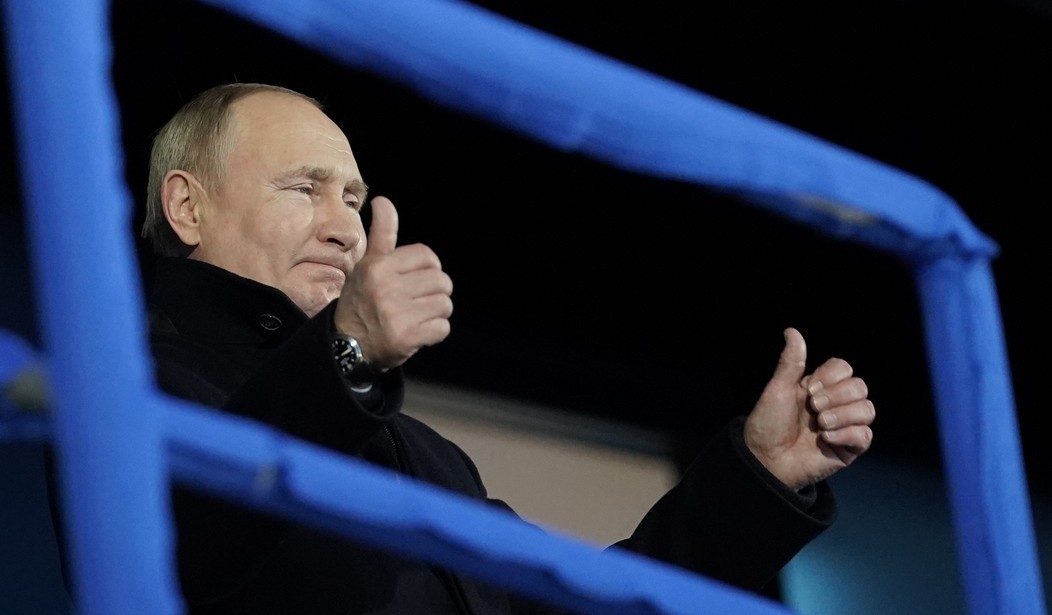Does anyone still harbor any doubts about Vladimir Putin’s long-term strategy? In a speech that started off as a history lesson from Politburo U, the Russian president announced his intention to recognize the independence of the separatist-controlled Luhansk and Donetsk regions, which comprise nearly half of Ukraine. Putin decried the “madness” that gave former Soviet republics self-determination in the first place, an argument with ominous implications for the Baltic states.
Maybe, anyway:
“The president of Russia said that he intended to sign the relevant decree in the near future,” the Kremlin said. “The president of France and the Federal Chancellor of Germany expressed their disappointment with this development. At the same time, they indicated their readiness to continue contacts.”
In an evening address to the nation, Mr. Putin made the case that Ukraine is by history and makeup an integral part of Russia: “Colleagues, comrades, close ones, relatives, those who are tied up with us in family and blood ties.”
Mr. Putin also laid out a long history of grievances since the fall of the Soviet Union and the loss of the states that once made it up.
“We gave these republics the right to leave the union without any terms and conditions,” he Putin said. “This is just madness.”
Mr. Putin is recognizing the territories’ independence, the Kremlin said earlier, in the face of “the military aggression of the Ukrainian authorities,” as a result of which “the civilian population is suffering.”
That language makes it clear that not only will Putin recognize the independence of the two Donbas provinces, but that Russia will back that up directly with military force. That does raise one interesting question about just what Putin might — or might not — have planned next. CNN’s Bianna Golodryga offered this as a potential off-ramp:
This is being interpreted among analysts on independent Russian media that this could give Putin an off-ramp, and the lesser of bad options for Zelensky. https://t.co/pWYYIohSdp
— Bianna Golodryga (@biannagolodryga) February 21, 2022
In one sense, not much really changes except for the public posture of the various countries, including the US. Russia has controlled Luhansk and Donetsk regions through its proxies for eight years. Ukraine’s not strong enough to take it back even if they weren’t concerned about providing a pretext for a Russian invasion with an attempt to assert its sovereignty. The US and EU (and the UN) have been impotently demanding Putin pull out of those areas, but they haven’t pressed that case very hard — and have mostly let Putin off the hook on tough sanctions.
In other words, Putin’s least-risky path to a domestic-audience victory is imposing a hard partition in Donbas and occupying it directly — and stopping at that point. The heavily ethnic-Russian regions will largely welcome the alliance, which means that Putin won’t have to worry about an occupation of extremely hostile areas. That means a lot fewer body bags, a lot more propaganda films of being greeted as liberators, and in general a lot less capital being burned over the next several years, both economic and political.
Where does that leave the EU, US, and NATO? As long as Putin’s troops don’t roll into any other part of Ukraine, they will likely have an unpleasant mix of status quo and fait accompli. It will give them an excuse to avoid the heaviest sanctions on Putin, namely the Nordstream 2 pipeline for energy sales, which Germany in particular wanted to avoid. As long as Putin stays within the partition, Germany is likely to eventually oppose any truly effective sanctions, especially if the shelling and maneuvers around the border stop. France, the US, and the NATO command will keep moving assets into the eastern frontier, but Putin can play that game too in Belarus. (And has.)
For instance, the White House was quick off the mark yesterday with an announced sanctions list. However …
Symbolic as there is already next to none of this to, from, or in Donetsk and Luhansk occupied territories. https://t.co/T7vSWRfonz
— Christopher Miller (@ChristopherJM) February 21, 2022
The Biden admin targets Ukraine's separatists regions in a new EO, prohibiting trade/new investment/or financing in those regions. This announcement – coming within hours of Putin's speech – is separate from "swift & severe economic measures" for any Russian invasion, Psaki says. pic.twitter.com/Gdm6ZrypSI
— Kylie Atwood (@kylieatwood) February 21, 2022
And later last night, the White House split some very fine hairs on what constituted an “invasion” (SAO means senior administration official):
On a media call, an SAO declined to say if Putin moving troops into separatist territories in Eastern Ukraine constituted an invasion.
But after, another official told me that the admin. defines an “invasion” as Russian troops entering a part of Ukraine NOT occupied since 2014.
— Ashley Parker (@AshleyRParker) February 22, 2022
Note the very cautious and incremental application of sanctions by the Biden administration. It’s a fascinating pas de deux so far. We are clearly signaling an off-ramp here, if Putin wants to take it.
Putin’s smart enough to know that the US, EU, and NATO are not going to sacrifice the Baltic states, Poland, Romania, and Bulgaria without a shooting war. He’s also smart enough to know that we won’t start a war over Ukraine either. This allows Putin the least-expensive win still on the table, an outright humiliation of the West and a strong message to Kyiv that they’d better get back on his good side or else.
If Putin’s still rational, he’d take his winnings and leave the table. That’s still something of an if, however.








Join the conversation as a VIP Member